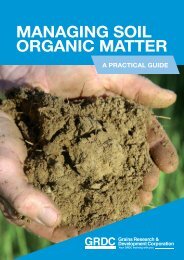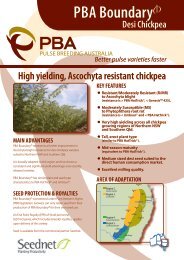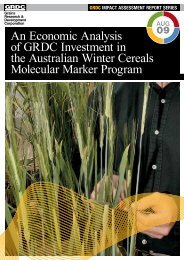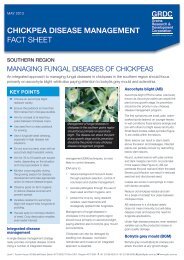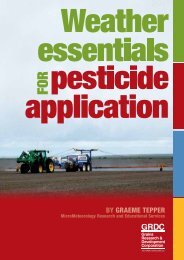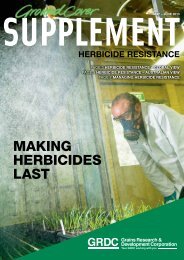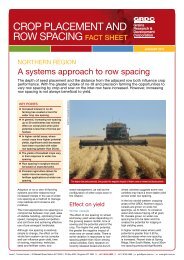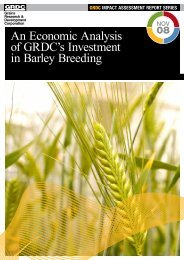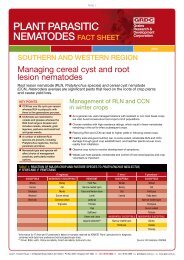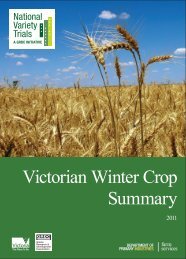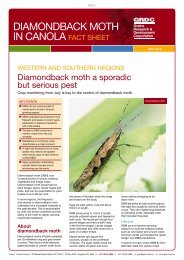Insects of Southern Australian Broadacre Farming Systems - Grains ...
Insects of Southern Australian Broadacre Farming Systems - Grains ...
Insects of Southern Australian Broadacre Farming Systems - Grains ...
You also want an ePaper? Increase the reach of your titles
YUMPU automatically turns print PDFs into web optimized ePapers that Google loves.
If you see anything unusual,<br />
call the Exotic Plant Pest Hotline<br />
1800 084 881 Speak to your department<br />
<strong>of</strong> primary industries before<br />
sending any samples.<br />
<strong>Insects</strong> <strong>of</strong> <strong>Southern</strong> <strong>Australian</strong> <strong>Broadacre</strong> <strong>Farming</strong> <strong>Systems</strong> Identification Manual and Education Resource © 2012<br />
Calls to the Exotic Plant Pest Hotline are forwarded to<br />
an experienced person in the department <strong>of</strong> primary<br />
industries in each state or territory. Every report will be<br />
investigated and treated confidentially.<br />
If you suspect that you have found an exotic plant pest<br />
the following general precautions should be taken:<br />
• mark the location <strong>of</strong> the pest detection and limit<br />
access to the area;<br />
• do not allow people, stock and equipment near the<br />
affected area;<br />
• wash hands, clothes and boots that have been in<br />
contact with affected plant material or soil;<br />
• do not touch, move or transport affected plant<br />
material without advice from your state department<br />
<strong>of</strong> primary industries.<br />
2<br />
Biosecurity vehicle check list<br />
SECTION 7 Biosecurity<br />
It is essential that the<br />
correct sampling protocol<br />
is followed including<br />
packaging, handling and<br />
transport to the laboratory<br />
assigned for diagnosis.<br />
Incorrect handling could<br />
spread the pest further or<br />
render the samples unfit for<br />
identification.<br />
More information<br />
For copies <strong>of</strong> the <strong>Grains</strong> Industry Biosecurity Plan and<br />
the Farm Biosecurity Manual for the <strong>Grains</strong> Industry,<br />
as well as information on key exotic pests <strong>of</strong> the<br />
grains industry, visit the Plant Health Australia website<br />
(www.planthealthaustralia.com.au/biosecurity/<br />
grains) or contact biosecurity@phau.com.au, or your<br />
state’s <strong>Grains</strong> Biosecurity <strong>of</strong>ficer.<br />
Carry a biosecurity tool kit in your vehicle. Each tool kit should contain cleaning items for clothing, vehicles<br />
and equipment in addition to personal safety gear.<br />
A basic vehicle biosecurity kit should include:<br />
• Stiff brushes and a scraper for cleaning tyres<br />
and shoes.<br />
• Dustpan and brush for cleaning inside vehicle<br />
cabins.<br />
• Personal safety gear such as rubber boots, rubber<br />
gloves, disposable overalls and boot covers.<br />
• Footbath and bucket for disinfecting boots<br />
and equipment.<br />
• Approved disinfectant for cleaning down<br />
vehicles/equipment.<br />
• Hand sanitiser, soap and a minimum <strong>of</strong> 5 litres<br />
<strong>of</strong> water.<br />
• A small hand sprayer with a solution <strong>of</strong><br />
methylated spirits (at the rate <strong>of</strong> 70%<br />
methylated spirits to 30% water).<br />
• Flagging tape to mark sample location.<br />
• Strong plastic and paper bags for collecting<br />
samples and sealing items for disposal.<br />
Additional items for an advanced biosecurity kit:<br />
• Camera.<br />
• GPS to record sample collection location.<br />
• Sample jars and plastic boxes for sample<br />
collection.




